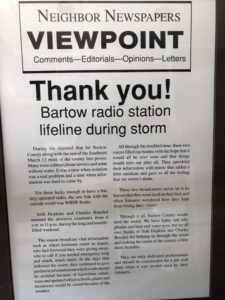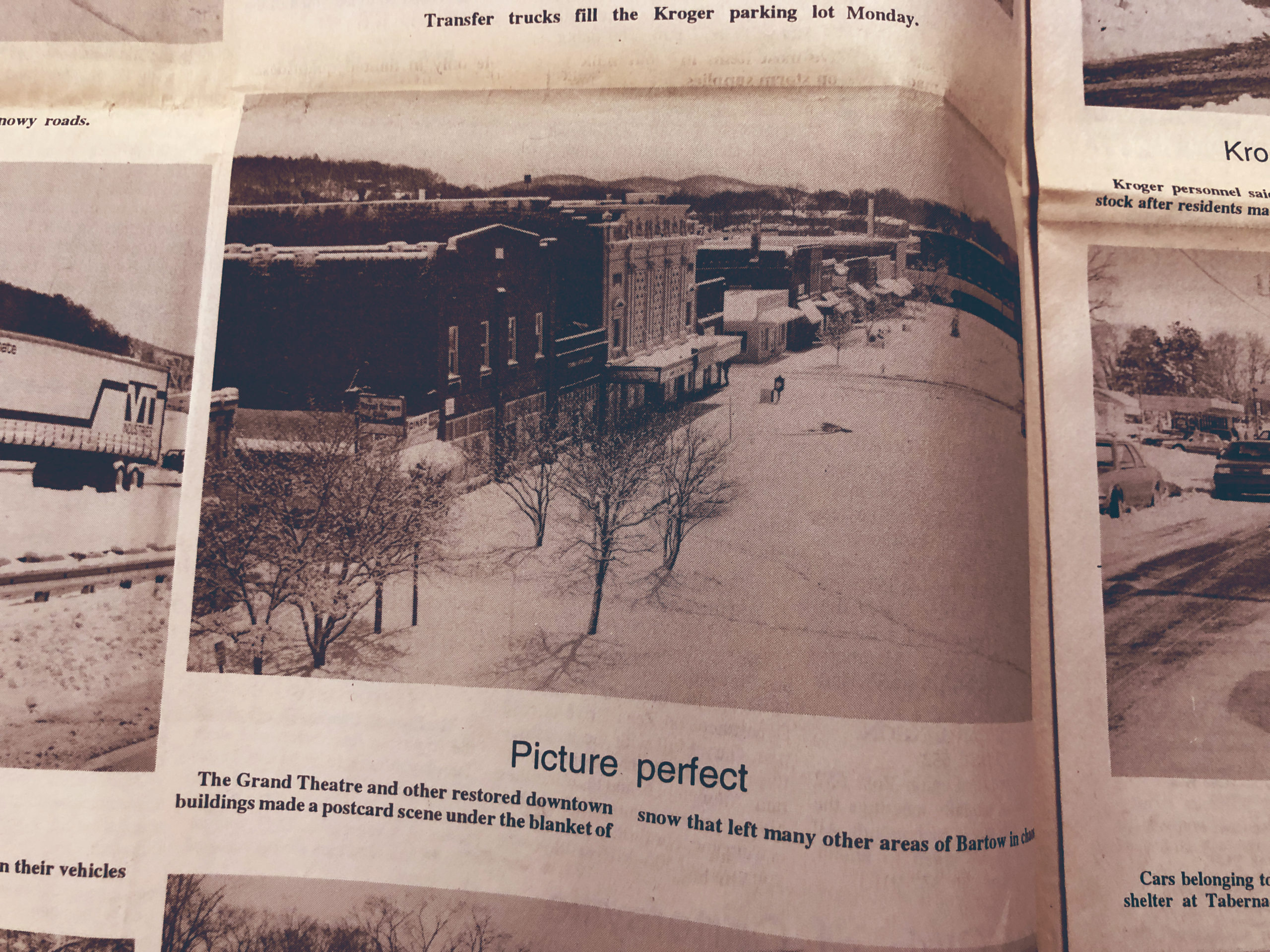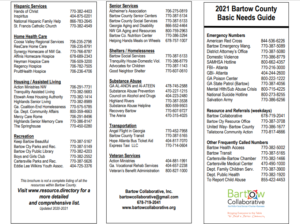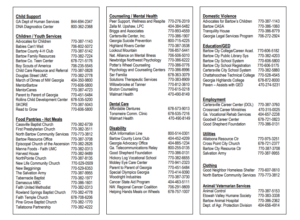This Sunday marks 29 years since the biggest blizzard in Georgia history.
The Superstorm of 1993 brought snow and strong winds to residents from Alabama to Maine, and Northwest Georgia experienced between 12 and 30 inches of snow.
The days before were warm, making some locals doubt that such an intense weather event could really be headed their way.
Seth Hopkins and Charles Brachel were anchors for WBHF Radio at the time. In the preceding days, Hopkins said he couldn’t imagine that Northwest Georgia could be hit by a storm of this magnitude.
“We were joking about it,” he said. “About 3 a.m. on Saturday morning, [Brachel] called me and said, ‘If you’re coming to the station, you better come now.’”
Brachel had agreed to stay overnight at the station. Hopkins drove through only a couple of inches of snow to join him in the early morning. But the snow kept coming, and soon they were snowed in. For the next few days, they took turns sleeping, answering phones, and cleaning snow out of the satellite dish.
The storm left drivers stranded on I-75 and many people walked in the frigid temperatures to find food or necessary supplies. Bartow resident Jeff Potts told WBHF he worked for a local wrecker company at the time and he helped to pull some of the stranded cars off the roadway.
Joshua Graham was only 7 years old at the time, but he remembers riding around for hours searching for diapers and baby formula for his small cousins.
“There were some high schoolers who drove around on four-wheelers,” he said. “My grandfather and I had to get on the back of the four-wheelers. They drove us from Taylorsville all the way to Cedartown and Aragon – a huge area, because we were trying to find stores where we could get food and supplies for the babies.”
Graham thought of the situation as akin to camping at first, but he began to realize how serious things were the longer they searched. He and his grandfather ended up at a backroad gas station, where the proprietor limited each family to one pack of diapers.
Snow weighed down the trees, causing them to fall on homes and power lines. Both Potts and Graham recall relying on that same snow while the power was out. Graham’s family used melted snow to boil hot dogs and Potts’ family – which included a dozen people packed into a single-wide trailer – filled their freezer with it to keep perishable food cold.
“We slept in the floor, on the couch, anywhere we could get,” said Potts, who had brought some of his wife’s family to stay with them.
Many telephone lines were also down, so people like Potts relied on the radio to keep up to date on conditions.
Hopkins and Brachel shared news about the storm over WBHF’s airwaves, but they also spread the word about where people in the community could direct resources like food.
“The Holiday Inn Hotel had become kind of a gathering spot for a lot of people who were stranded on I-75 up at that exit,” Hopkins recounted. “I think they had something on the order of a thousand people who were camped out there. The power had gone out at some point and they had taken all the groceries out and were making huge vats of soup to feed everybody. People were just sleeping on the floor and nobody had any idea that was all going on.”
When the hotel ran out of food, employees called WBHF to get the message out and request that people bring more.
While Hopkins and Brachel delivered the news, those who lived nearby walked to the station to bring them food.
The human toll
Graham told WBHF he felt fortunate that his family was able to gather and keep each other safe because he knows not everyone was so lucky.
The storm left 15 people dead. According to The Daily Tribune, one 41-year-old man succumbed to hypothermia in his home after his power went out and a 75-year-old man asphyxiated from exhaust while trying to keep warm with a gasoline-powered generator. Many people were crushed in their homes by falling trees.
Executive Director of Bartow Collaborative Doug Belisle told WBHF that senior adults, unhoused individuals, and low-income residents are all at risk during cold weather conditions. Belisle said the county has come a long way in offering assistance to these populations when the temperature drops, with the online community resource directory and the Bartow Basic Needs guide. Tallatoona Community Action Partnership offers programs to help low-income families and seniors pay their utility bills, though some residents say they’ve reached out and received little response.
Weather forecasters expect this weekend to be colder than usual as well, and the Good Neighbor Homeless Shelter has collaborated with Tabernacle Baptist Church to offer the church at 112 E Church St in Cartersville as a warming station. Those who are unhoused or without power can come in the evening to get a hot meal and warm place to sleep, but they have to leave in the morning.
29 years ago, many community buildings turned into refuges from the cold. It took weeks for Bartow County to recover from the Superstorm of 1993. Power slowly returned to homes in the area, and fallen trees were removed from roadways.
After the blizzard, the owner of the Holiday Inn, Richard Kessler, threw a party for everyone who worked during the storm. Hopkins and Brachel were invited, and the Neighbor Newspapers printed a column thanking the anchors for their work at the station. According to the column, “the station broadcast vital information such as where kerosene could be found, who had firewood they were giving away, who to call if you needed emergency help and much, much more.”

A column printed in the now-defunct Neighbor Newspapers thanking WBHF anchors Seth Hopkins and Charles Brachel for their work during the blizzard.
Decades later, Hopkins said, “We were happy to just be doing our jobs and serving the community, but the recognition that came afterwards was nice to receive as well.”
However, Hopkins said his main takeaway is the importance of being prepared for an event like this.
“When they’re predicting something big is going happen, take it seriously,” he advised. “Make sure you have what you need in your home – or your car – or wherever you might end up being. […] Make sure you always have a full tank of gas; some food if you needed it and some water if you needed it in the vehicle would be an important thing.”
Texas’s unexpected cold snap of 2021 reminded Graham of the Blizzard of ’93, and he said he was happy to see people using social media to share tips on how to survive using the lessons they learned nearly 30 years ago.
As an adult, he reflects on the community that worked together to help each other recover from the blizzard. He didn’t even know the names of those boys who helped him look for baby supplies, but they drove around getting people where they needed to go.
“It was probably the first unprecedented event I lived through in my life. There’s been a few more since then,” Graham said, laughing. “A lot of times people are so focused on being confrontational and people aren’t necessarily getting along, but in that moment everyone came together.”



